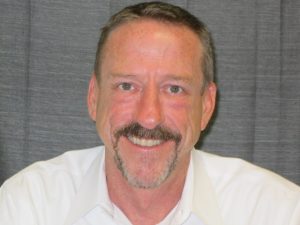A pilot project is in the works that will provide the Chico Police Department – criticized for its lack of crisis intervention efforts in the past – with two mobile mental health counselors to work alongside police officers 10 hours a day.
The program is described in a Nov. 27 memorandum, written by Butte County Department of Behavioral Health Director Dorian Kittrell to the county Board of Supervisors and obtained by ChicoSol.

Kittrell said his department is working on a memorandum of understanding (MOU) with Chico PD to assign two full-time mental health workers to the pilot mobile crisis response team, which will operate seven days a week from about 8:30 a.m. to 6:30 p.m.
“We are finalizing a non-financial, interagency MOU in December and then training and operational planning will be undertaken in January,” says Kittrell’s memo. “The goal is to roll out services for the project on, or around, Feb. 1.”
The memo says that, under the pilot program, a counselor will respond to mental health calls as requested by police via radio dispatch. One of the goals of the program is to assist Chico PD with “their response times and their outcomes,” Kittrell told ChicoSol.
To the partnership, Chico PD will be providing radio and safety training for the mental health staffers, as well as donating a vehicle for their use. The two agencies will formally evaluate the program after one year.
“I certainly hope this will grow into greater collaboration in the future,” Kittrell told ChicoSol.
Chico Police Chief Mike O’Brien said Chico PD “is very excited about partnering with Butte County Behavioral Health on this endeavor. Both agencies will speak more directly on the specifics of the program when all of the details have been finalized in the coming weeks.”
O’Brien declined further comment.
Chico PD was criticized for its lack of crisis intervention efforts after two of its officers gunned down Desmond Phillips, a 25-year-old black man in mental crisis, in his own living room on March 17. Officers Alex Fliehr and Jeremy Gagnebin together fired 16 rounds, shooting Phillips 11 times in the killing, which Butte County District Attorney Mike Ramsey determined to be justified. (See previous ChicoSol story here.)
In the wake of the Phillips shooting, Andy Duch, then a Butte County sheriff’s captain who led the county’s annual Crisis Intervention Team (CIT) training academy for its first seven years, blasted Chico PD’s claims about its crisis training as “overstated and deceptive … propaganda” in a ChicoSol exclusive. David Phillips, Desmond’s dad, says he was told by state Attorney General Xavier Becerra that a state investigation is being conducted into the shooting.
Lisa Currier, who directs Chico-based Crisis Care Advocacy and Triage, said the use of crisis-response teams by Chico PD would be a step in the right direction.

“I think it’s a positive approach; it’s what we’ve been talking about for years,” Currier said. “If they’re going to do it, that’s great news. But what are the limitations?”
By limitations, Currier said she’s concerned that people in mental crisis will not receive critical follow-up services beyond their immediate emergencies.
Currier said Crisis Care Advocacy and Triage recently responded to a call from the Downtown Chico Ambassadors reporting a naked woman at a coffee shop. By the time Currier arrived, the woman was gone, but Currier found her under a tree in Bidwell Park and stayed in touch with her.
That woman, like many others in mental crisis, has great difficulty navigating Behavioral Health’s “in-take process” without support, Currier said. Crisis Care Advocacy and Triage tries to provide “wrap-around” services to make sure people in crisis are getting any longer-term services they require, she said.
Asked whether the Department of Behavioral Health ever utilizes Crisis Care Advocacy and Triage’s services, Currier replied: “No, but I call them” seeking services for her clients. “Why aren’t they having the conversation with us?”
In response, Kittrell said he hopes the pilot program will assist people in obtaining services and, if possible, avoiding involuntary detention and hospitalization.
“I’m glad Lisa (Currier) is in support of the program,” Kittrell said. “I appreciate all the efforts that Crisis Care Advocacy and Triage provide in the community, and they do interface with our services on a regular basis.”
While Butte County will be piloting a 10-hour-a-day crisis response with Chico PD, Shasta County plans to go even further in the spring in partnership with the Redding Police Department.
Shasta is seeking to use a $500,000 state grant to retain Hill Country Health and Wellness Center, according to a recent article in the Redding Record Searchlight. The plan is for Hill Country Health to hire six personnel — three clinicians and three case managers — who would work in pairs and be available 12 to 16 hours per day. In contrast, in the Chico PD pilot, just one counselor would be on duty most times during the 70 hours of coverage per week.
Kittrell told ChicoSol that he saw the need when he became director of the Department of Behavioral Health in 2014 to forge stronger ties with Butte County law enforcement agencies. The closest relationship developed to date has been with the Sheriff’s Department, which has called for Behavioral Health’s assistance in a number of potentially explosive situations, Kittrell said.
At the moment a Sheriff’s Department sniper shot and killed a drunken, pistol-waving Mark Jensen of Durham on Aug. 17 from nearly 130 yards away, a mental health counselor was at the law enforcement staging area about one-third of a mile away but hadn’t had a chance to engage Jensen.
In a July 15 standoff that ended without bloodshed, Kittrell said Behavioral Health was on the scene when an armed 39-year-old Paradise-area man was allegedly pacing his property and demanding that officers shoot him, according to this account in the Chico Enterprise-Record. The man surrendered after a standoff of nearly three hours.
“We were very much a part of that,” Kittrell said.
Kittrell said that sometimes Behavioral Health’s successful interventions go unreported in the news media because of client privacy protections. In one such recent case, mental health staff, at the sheriff’s office’s behest, worked weeks to successfully defuse a potentially dangerous situation.
Dave Waddell is news director at ChicoSol.

About time
I had a psychologist friend who worked for Berkeley Behavioral Health and did exactly this with the Berkeley PD. She saved lives. She knew how to defuse situations and she conveyed strong personal authority and respect for others, so she could intervene and gain trust in crisis situations. This is a good step.
Two Behavioral Health Management positions – the top paid in Butte County – cost over $600,000 in salary and benefits. The top paid position only comes to Butte County via Skype to talk to staff. Another “psychiatrist” costs about $300,000. I’m going to guess this person never meets clients one-on-one.
Currier admits, the Behavioral Health system is difficult to “navigate” – why? Because there are too many overpaid management positions that have nothing to do with serving clients.
They need more support advocates – I don’t know who could do a job like that for the poverty wages they pay staff. The Behavioral Health Department needs a complete overhaul. I don’t think our board of supervisors is qualified to run it.